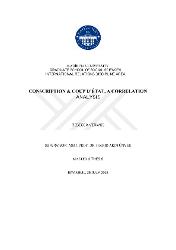| dc.contributor.advisor | Ünver, Hamid Akın | en_US |
| dc.contributor.author | Verwijs, Rebecca Marıa Gesıne | |
| dc.date.accessioned | 2020-02-27T16:53:43Z | |
| dc.date.available | 2020-02-27T16:53:43Z | |
| dc.date.issued | 2018 | |
| dc.identifier.uri | https://hdl.handle.net/20.500.12469/2802 | |
| dc.description.abstract | The objective of this thesis is to analyse the relation between conscription and coup d'état. The intention of the thesis is to fill a gap in the literature regarding both conscription and coup d'état since no quantitative research on the combination of both topics has been performed yet. Although several countries are currently using conscription with the justification that conscription is supposed to protect the country from coup d'état. These expressions are thus completely speculative since there is no research to back up this claim that conscription in fact protects an country from coup d'état. The relationship between conscription and coup d'état has been analysed through the mean of several variables: democracy; freedom index, polity IV index, and regime type, economy; GDP per capita and the GINI, military management; military expenditures per capita and military personnel per capita, religion; Islam, Christianity and others, fractionalisation; religious and linguistic and lastly through the variable of colonisation. These variables have been chosen in order the reflect the extent and complexity involved with coup d'état as well as with conscription. The research has made use of quantitative research methods using a zero-inflated Poisson regression. The results of the zero-inflated Poisson regression show that there is in fact a relation between conscription and coup d'état. The analyses showed an inverted nonlinear relation between GDP per capita, conscription and coup d'état, where the increase of GDP per capita, and years of conscription exercised in a country showed an increase of coup d'état up to a certain point, after which the relations seizes to exist. Other relations with coup d'état could be found with the variables of democracy, economy, military personnel, religion and linguistic fractionalisation. There, however, does not show to be a relation between military expenditures, religious fractionalisation or colonialism and coup d'état. | en_US |
| dc.description.abstract | Bu tez, literatürde zorunlu askerlik ve darbe konularını aynı anda ele almış nitel bir araştırma bulunmaması dolayısıyla var olan boşluğu doldurmaya katkıda bulunma amacı gütmektedir. Öte yandan bazı ülkeler an itibariyle zorunlu askerlik uygulamasının hükümet darbelerine karşı koruyacağı çıkarımında bulunmaktadır. Bu tür ifadeler, zorunlu askerliğin ülkeler için darbeleri engelleyici özellikte olduğunu destekleyecek çalışmalar bulunmaması dolayısıyla speakülatif olma özelliğinden kurtulamamaktadırlar. Bu çalışmada, zorunlu askerlik ve darbe arasındaki ilişki birkaç değişken üzerinden analiz edilmiştir: demokrasi; özgürlük indeksi, demokrasi düzeyi, rejim türü, ekonomi; kişi başına gayri safi yurtiçi hasıla ve gini katsayısı, ordu yönetimi; kişi başına ordu harcamaları ve kişi başına düşen ordu mensubu sayısı, din; İslam, Hristiyanlık ve diğerleri, ayrışım miktarı; dini ya da dil bakımından ve son olarak da kolonileşme değişkeni. Sözü geçen değişkenler, zorunlu askerliğin ve darbenin kapsam ve karmaşıklığını yansıtabilme amacı güdülerek seçilmiştir. Bu araştırmada nitel araştırma yöntemlerinden sıfır değer ağırlıklı poisson regresyon kullanılmıştır. Sıfır değer ağırlıklı poisson regresyon sonuçları zorunlu askerlik ve darbe arasındaki ilişkiyi işaret etmiştir.Analizler sonucu kişi başına gayri safi yurtiçi hasıla, zorunlu askerlik ve darbe arasında ters-lineer olmayan bir ilişki tespit edilmiş, kişi başına gayri safi yurtiçi hasıla ve bir ülkede zorunlu askerliğin uygulanma süresi yükseldiğinde darbe sayısında da yükseliş gözlenmiş ancak bir noktadan sonra bu ilişki yok olmuştur. Darbe değişkeninin demokrasi, ekonomi, ordu mensubu sayısı, din ve dilsel ayrışım değişkenleriyle de ilişkisi bulunmuştur. Öte yandan, darbe değişkeninin askeri harcamalar, dini ayrışım ya da kolonileşme değişkenleriyle ilişkisi bulunamamıştır. | en_US] |
| dc.language.iso | eng | en_US |
| dc.publisher | Kadir Has Üniversitesi | en_US |
| dc.rights | info:eu-repo/semantics/openAccess | en_US |
| dc.subject | conscription | en_US |
| dc.subject | coup d'état | en_US |
| dc.subject | democracy | en_US |
| dc.subject | economy | en_US |
| dc.subject | military management | en_US |
| dc.subject | religion | en_US |
| dc.subject | colonisation | en_US |
| dc.subject | relationship | en_US |
| dc.subject | coup-proofing | en_US |
| dc.subject | zorunlu askerlik | en_US |
| dc.subject | darbe | en_US |
| dc.subject | demokrasi | en_US |
| dc.subject | ekonomi | en_US |
| dc.subject | ordu yönetimi | en_US |
| dc.subject | din | en_US |
| dc.subject | kolonileşme | en_US |
| dc.subject | ilişki | en_US |
| dc.subject | darbe engelleyici | en_US |
| dc.title | Conscription & Coup D'état, a correlation analysis | en_US |
| dc.type | masterThesis | en_US |
| dc.department | Enstitüler, Lisansüstü Eğitim Enstitüsü, Uluslararası İlişkiler Ana Bilim Dalı | en_US |
| dc.relation.publicationcategory | Tez | en_US |
| dc.identifier.yoktezid | 528103 | en_US |
















